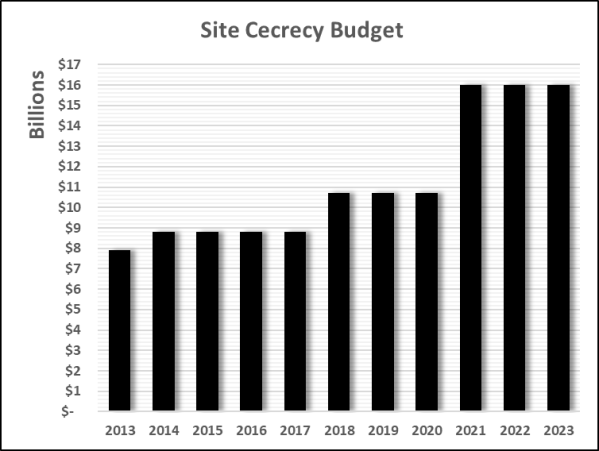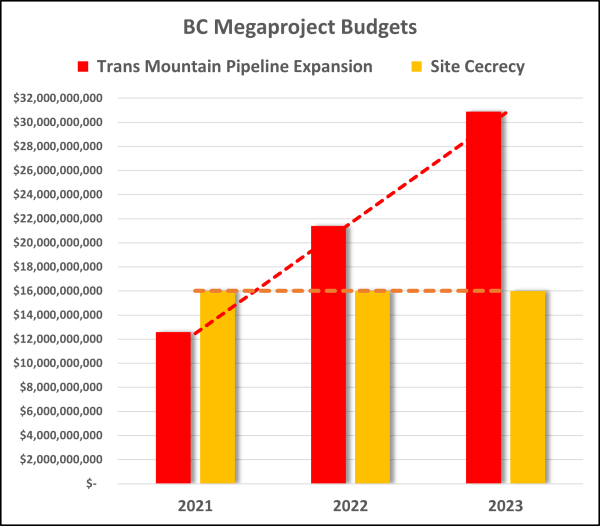Marc Eliesen, former president and CEO of BC Hydro, chair and CEO of Ontario Hydro, and chair of Manitoba Hydro wrote in 2021:
When Site C was first proposed the budget was $3.3 billion, it rose to $6.6 billion, then $7.9 billion, to $8.8 billion, then $10.7 billion and now $16 billion — with no guarantee that $16 billion represents a final cost estimate.
Vancouver Sun — Runaway costs on Site C — enough is enough
In 2021, the budget for expansion of the government owned Trans Mountain Pipeline (TMX) was $12.6 billion. In the first quarter of 2023, the cost estimate was bumped 145% to $30.9 billion. In September 2023, constructors warned about a further delay of nine months. Since the pipeline expansion has been costing $600 million to $900 million a month, that delay will have significant consequences.

In 2021, the budget for BC Hydro’s Peace River hydropower project announced as $16 billion. Two and one-half years later, the budget remains unchanged, despite cost pressures similar to those faced by TMX.


Managers of the two largest megaprojects underway in British Columbia have proven themselves unable or unwilling to administer public funds wisely. BC Hydro has proven it prefers secrecy to transparency. We can only guess at the final costs of Site C, the largest ever megaproject undertaken by British Columbia.
Bent Flyvbjerg of Oxford University is the world’s most cited scholar of megaproject management and mismanagement. One of his studies included this:
Underestimation cannot be explained by error and is best explained by strategic misrepresentation, that is, lying. The policy implications are clear: legislators, administrators, investors, media representatives, and members of the public who value honest numbers should not trust cost estimates and cost-benefit analyses produced by project promoters and their analysts.
If BC Hydro’s project mirrors the cost escalation of TMX during the past three years, the dam’s final cost will hit $39 billion. Even if it totals only $20 billion, that’s quite a subsidy for production of fossil fuel that science says should be unextractable.
If you find value in posts and dialogue at IN-SIGHTS.CA, please consider financial support. It is a simple process explained HERE.
Categories: Site C




In the big scheme of things these 2 projects, at which ever billions you want to believe, are peanuts compared to Canada’s GDP for 2022, which was USD2.015 trillion. Besides the fact that this 30 billion is a total so each year’s expenditure compared to GDP is infinitesimal.
LikeLike
Justifying government’s fiscal waste and fraud because the sum is a small percentage of the nation’s wealth is foolish. Would the Royal Bank and law enforcement turn a blind eye to theft of $1 million because it is only 0.00005% of the victimized company’s total assets?
Imagine what tens of billions of dollars could do to improve transit, or healthcare, or education, or to moderate the toll that inflation is extracting from poor people and seniors on fixed incomes. Imagine if billions invested in Canadian science led to a breakthrough in energy storage that allowed us to use wind and solar exclusively to meet new electricity requirements.
But wasting money on assets that will be stranded is only part of the problem. This $35 billion pipeline expansion is to transport dirty oil so it can be consumed elsewhere. Canada will fail to account for the resulting emissions, but Earth will not.
There is only one planet, and it is sending endless warning signals that we must address climate change to avoid the world becoming uninhabitable for future generations.
LikeLike
The Criminal Code of Canada proscribes activities and mandates sanctions (such as serious jail sentences) for any company officials that knowingly mislead shareholders. For example:
“False prospectus, etc.
* 400 (1) Every person is guilty of an indictable offence and liable to imprisonment for a term of not more than 10 years or is guilty of an offence punishable on summary conviction who makes, circulates or publishes a prospectus, a statement or an account, whether written or oral, that they know is false in a material particular, with intent
* (a) to induce persons, whether ascertained or not, to become shareholders or partners in a company,
* (b) to deceive or defraud the members, shareholders or creditors, whether ascertained or not, of a company, or
* (c) to induce any person to
* (i) entrust or advance anything to a company, or
* (ii) enter into any security for the benefit of a company.”
I submit that certain officials of the corporate entities responsible for TMX and BC Hydro’s Site C project would have long ago been criminally charged or at the very, very, least fired by their respective shareholders were either of these a private enterprise. But as shareholders of these public debacles, our only remedy seems to be through the ballot box, and that remedy is not realistically viable because our choices are all captives of industry. The law needs to change, but good luck with that.
An even more egregious fact is that both projects have as their ultimate purpose the furtherance of fossil fuel desecration of our climate for private profit.
LikeLike
You have come to the nub of the issue Lew. In 2016 BC Hydro stopped reporting using the” Annual Report”. Since then they report using the “Service Plan” even when the provincial legislation requires all Crown Corporations to report using the Annual Report method.
I tried asking the AG about this change but got no answer.
My speculation is that there were/are legal liabilities the Board, Executives and Minister were uncomfortable with so they sought exemption from the “Crown”. A publicly listed company would likely loose it’s listing and ability to solicit money from the public if the requirement of an audited annual report was not met. This requirement also gave rise to the use of “private equity transaction” , where the common shareholder is too often taken advantage of.
LikeLike
I read somewhere that government itself is a lie, as our so called democracy. Except for a few short weeks before an election, government largely ignores the people and taxes with impunity to provide baubles to the masses to get reelected.
In today’s world, government is no better than the robber barons in the medieval ages, just tarted up a wee bit.
LikeLike
What can people do when their government trots out these numbers which are inherently suspect? Protests and letters to ministers don’t do any good, and by the time an election rolls around, the megaproject has passed the point of no return.
LikeLike
A friend of mine is convinced direct democracy, or at least extensive citizen participation in policy making, would cure many of the problems we face when elected representatives are more interested in serving special interests than the common good.
Representative democracy may be relatively efficient, but it is rather easily perverted.
LikeLiked by 1 person
I doubt that those in power would facilitate a transition to direct democracy. It may be possible to implement it in the aftermath of total collapse, by the survivors.
I read your posts with interest, Norm, but I have to say they are depressing! 🙂
LikeLike
I understand what you mean Audrey. My wife and others counsel me regularly to be more positive and not add to the surplus of negativity that bombards people today.
But that seems equivalent to watching your house catch fire and burn, and then saying, “Let’s enjoy the nice bonfire.”
LikeLiked by 1 person
True, unfortunately.
LikeLike
Bent’s words are echoes of what John Perkins wrote in his “Confessions of an Economic Hitman”.
There are those unidentified persons who seek to gain and hold power over the ignorant by talking them into borrowing more money than is close to being reasonable/prudent. Like Bent says, this is not accidental, but part of a plan to place populations into subservience.
LikeLike